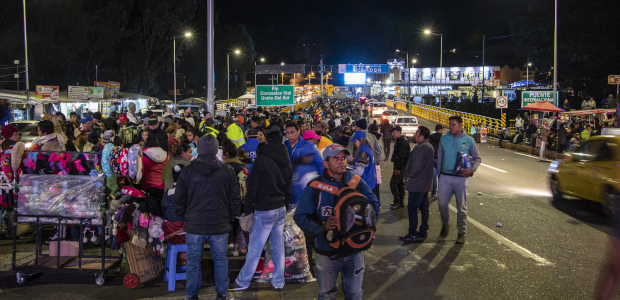
Venezuelan refugees and migrants wait at the Rumichaca International Bridge border crossing to enter Ecuador from Colombia. ; From late-August 2019, a change to Ecuador’s immigration rules meant that Venezuelan citizens intending to enter Ecuador must apply for a visa. In the days prior to the new visa requirement becoming enforceable, increasing numbers of Venezuelans arrivals were registered at the border between Ecuador and Colombia. At its peak, over 6,000 Venezuelan were registered at the Rumichaca International Bridge checkpoint in just one day. In total, more than 37,000 Venezuelans entered Ecuadorian territory in the week prior to the implementation of the rule change. UNHCR increased its presence at the bridge border to provide assistance to the Venezuelan refugees and migrants who joined more than 4 million people to have fled the political and economic crisis in the past few years.
UNHCR, the UN Refugee Agency is today appealing to countries worldwide to do far more to find homes for millions of refugees and others displaced by conflict, persecution or events seriously disturbing public order. This is as a report released today showed that forced displacement is now affecting more than one percent of humanity – 1 in every 97 people – and with fewer and fewer of those who flee being able to return home.
UNHCR’s annual Global Trends report, which comes two days ahead of 20 June World Refugee Day, shows that an unprecedented 79.5 million were displaced as of the end of 2019. UNHCR has not seen a higher total.
“We are witnessing a changed reality in that forced displacement nowadays is not only vastly more widespread but is simply no longer a short-term and temporary phenomenon,” said UN High Commissioner for Refugees Filippo Grandi. “People cannot be expected to live in a state of upheaval for years on end, without a chance of going home, nor a hope of building a future where they are. We need a fundamentally new and more accepting attitude towards all who flee, coupled with a much more determined drive to unlock conflicts that go on for years and that are at the root of such immense suffering.”
UNHCR’s Global Trends report shows that of the 79.5 million who were displaced at the end of last year, 45.7 million were people who had fled to other areas of their own countries. The rest were people displaced elsewhere, 4.2 million of them being people awaiting the outcome of asylum requests, while 29.6 million were refugees and others forcibly displaced outside their country.
Currently, only 314 asylum-seekers and refugees enjoy legal stay in Serbia. To develop effective migration management, Serbia should progress in implementing its obligations under international and national refugee law. Asylum-seekers and refugees should be issued biometric identity and travel documents. While they enjoy access to public health and education, they still need to be granted non-discriminatory access to employment, residency, citizenship and other rights. The UN Refugee Agency also supports the improvement of reception conditions, whereby asylum-seekers and refugees would no longer be mixed-up with irregular migrants in collective centres but be assisted to live in safer private accommodation instead.
While the Regional Housing Programme helped more than 16,500 vulnerable former refugees from the region, some 68,000 vulnerable internally displaced persons still await urgent support for a dignified self-sustainable life in Serbia, twenty years after their displacement.
8 things you need to know about forced displacement today
100 million people at least were forced to flee their homes in the past decade, seeking refugee either in or outside their countries. That’s more people fleeing than the entire population of Egypt, the world’s 14th most populous country.
Forced displacement has almost doubled since 2010 (41 million then vs 79.5 million now).
80 percent of the world’s displaced people are in countries or territories affected by acute food insecurity and malnutrition – many of them countries facing climate and other disaster risk.
More than three-quarters of the world’s refugees (77 percent) are caught up in situations of long-term displacement – for example the situation in Afghanistan, now in its fifth decade.
More than eight of every 10 refugees (85 percent) are in developing countries, generally a country neighbouring the one they fled.
Five countries account for two-thirds of people displaced across borders: Syria, Venezuela, Afghanistan, South Sudan and Myanmar.
Global Trends Report counts all major displaced and refugee populations, including the 5.6 million Palestine refugees who fall under the care of the United Nations Relief and Works agency for Palestine.
The 2030 Sustainable Development commitment of “leaving no one behind” now explicitly includes refugees, thanks to a new indicator on refugees approved by the UN Statistical Commission in March this year.
NOTE
UNHCR’s Global Trends report is released in parallel with its annual Global Report, which reports on actions UNHCR is taking to address the needs of all who are forced to flee, as well as the world’s known stateless populations.
For additional Information
UNHCR’s Global Trends report and an accompanying package of multi-media assets are available on our media page. The report is subject to a worldwide embargo of no use before 0500 GMT on 18 June 2020.
For more information on this topic, please contact:
In Geneva:
Andrej Mahecic, [email protected], +41 79 642 9709
Babar Baloch, [email protected], +41 79 513 9549
Marjanna Bergman, [email protected], +41 79 255 9271
Charlie Yaxley, [email protected], +41 79 58 08 702
Shabia Mantoo, [email protected], +41 79 337 7650
In New York:
Joung-ah Ghedini-Williams, [email protected], +1 917 940 1212
Kathryn Mahoney, [email protected], +1 347 443 7646
In Belgrade:
Mirjana Milenkovski, [email protected], + 381 63 275 154
Share on Facebook Share on Twitter